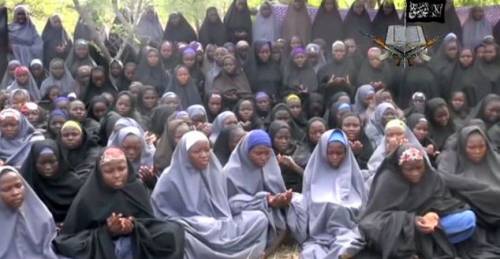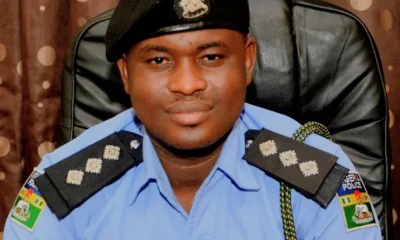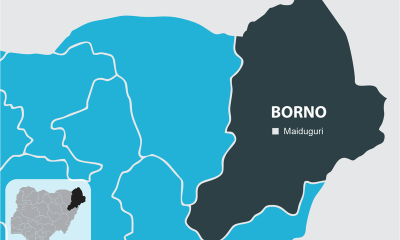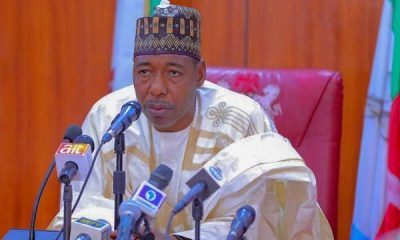News
Chibok: A Stain That Won’t Go Away!

How time flies! In just over 24 hours’ time it will be 10 years that one of the darkest days in the 64-year history of Nigeria as an independent nation took place.
On the night of April 14-15, 2014, some 276, mostly Christian female students aged 16 to 18 were kidnapped by the Islamic terrorist group, Boko Haram, from the Government Girls Secondary School in the town of Chibok in Borno State.
Incidentally, before the raid, the school had been closed for four weeks due to deteriorating security conditions, but the girls were in attendance to take their final exams in physics.
Fifty-seven of the school girls escaped the incident by jumping from the trucks on which they were being transported. Then, between 2016 and 2018, an ad- ditional 108 were either rescued by the military or released through negotiations.
The incident garnered global traction with the ‘Bring Back Our Girls’(#BBOG) campaign getting support from notable names, including the then First Lady of the US, Mrs Michele Obama and Nobel laureate, Malala Yousafzai, among others.
The mass kidnap not only opened the floodgates to other such despicable acts but has also left the families involved heartbroken as 91 of the girls have still not returned home. a decade later.
The anguish they’re still going through was explicitly captured on Wednesday, when the parents sent an open letter to the First Lady, Mrs Oluremi Tinubu, appeal- ing for her to come to their aid.
In the letter titled: ‘A Plea for Justice and Remembering the Chibok Girls – A Letter to Her Excellency Mrs Oluremi Tinubu’, the parents lamented that the horrific circumstances of that night had weighed heavily on them in the last decade.
The parents, in the letter signed by Yana Galang and Mallam Zanna, for and on behalf of the Chibok Parents Associa- tion and those whose children are yet to return, noted that, while the world might have moved on, “for us, the pain remains raw and the wounds refuse to heal. We are haunted by the memories of that night when our girls were taken from us, and every day we pray for their safe return. “We have not lost hope, Your Excellency.
We have not given up on our daughters, and we will continue to fight for their freedom until they are brought back to us. “We urge you to use your influence and your platform to ensure that the plight of the Chibok girls is never forgotten, that justice is served, and that those responsible for this heinous act are held account- able.” Incidentally, their letter came a week af- ter the BBC had also revisited the incident.
In an article titled: ‘Nigeria’s Chibok girls: Parents of kidnapped children heart- broken – again’, the Corporation spoke to a number of the released girls and their parents.
One of the parents, Yama Bullum, said he felt as if he had lost his daughter once again.
Jinkai Yama was one of the girls kidnapped on that fateful night. In theory, he should be happy that his daughter, Ms Yama, was one of 20 ‘Chi- bok girls’ rescued over the last two years from Boko Haram hideouts in Sambisa Forest; but he is not because he discovered that like some of the others recently freed women, she decided to remain married to one of the fighters who once held her captive! Of course, he might not have heard of the ‘Stockholm syndrome,’ which is the psychological condition of a victim who identifies with and empathises with their captor or abuser and their goals.
Ms Yama along with others who opted to remain with their insurgent ‘husbands’ now reside in the Borno State capital, Maiduguri, in a house constructed by Governor Babagana Umaru Zulum.
Unfortunately, this has not gone down well with Bullum, who said: “I am not happy with what the governor did. The girls managed to come out of the forest and the governor married them off again. Her mother is very angry.”
He found out when his daughter called him up to tell him last August – and handed over the phone asking him to talk to her husband, the former insurgent.
Until then, Bullum had assumed she was with other freed Chibok captives and her three children in a special welfare pro- gramme. Like several other Chibok parents, Bullum is disturbed by what seems to be the Federal Government’s approval of marriages between their rescued daughters and the men who abducted them.
By allowing the freed women to live with their former captors as wives, while the government provides their accommodation, is perceived by the parents as Governor Zulum sacrificing their daughters in the quest for stability in the region.
They see these marriages as a way to appease the former militants. The recent news of the continued “marriages” has further upset parents whose children were forced to convert to Islam during captivity.
“Some people in Chibok are saying: ‘How is it possible that after the rescue of the girls they are remaining in the Muslim faith?’” said Yakubu Nkeki, Chairman of the Chibok Parents’ Association.
The state appears to be grappling with the dilemma of respecting the girls’ wishes while fulfilling the desires of their parents.
However, responding, Zulum told the BBC: “My only interest is that we don’t want these girls to go back to the bush again.
“Even before they came out (of the Sambisa Forest), some of them gave us conditions – that they will not come without their husbands.
”One of these women, Aisha Graema, told the BBC that she would not have left the forest if she could not be with the militant she married two years after being abducted from the Chibok School.
“We have been married for eight years,” said the mother of three. “I first came out of the forest and then he followed me.
There in the bush, we had no relatives, no brother, no sister that is why we decided to come out.”
Another Chibok girl, Mary Dauda, said that she would not have been able to escape from the Sambisa Forest without her husband who helped her sneak away from the militants’ hideout.
“We had agreed that he would join me afterwards and present himself to the governor for rehabilitation,” said the 27-year-old
The welfare of the 20 most recently freed Chibok girls falls under the remit of Zuwaira Gambo, the Borno State Commissioner for Women’s Affairs and Social Development, who insisted the women were in no way coerced into staying with their spouses.
“They are the ones that insisted that without their husbands, they will not stay in Maiduguri,” Ms Gambo said.
“I asked them: ‘How can you want to stay with this man who destroyed your life?’ and they told me: ‘You will not un- derstand’.”
However, as we mark the poignant oc- casion, we should please put all those still suffering nightmares in our prayers and hope that the nation will be spared from such heinous mass abductions, and will finally know some peace and tranquility.
Source: New Telegraph
-

 News4 days ago
News4 days agoInsecurity: Kogi Schools Resume On Monday
-

 Opinion3 days ago
Opinion3 days agoDon’t Pull the Plug: Why Nigerians Are Pleading for the U.S. to Extend Its Police Training Program — and Why It Must Synergize With New Military Arrivals
-

 Crime3 days ago
Crime3 days agoVigilante Reportedly Shoots Colleague Dead In Plateau
-

 Crime5 days ago
Crime5 days agoPolice Arrest Two Over Murder Of 62-Year-Old Woman In Oyo











